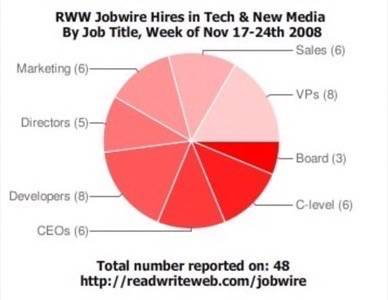It’s time for our weekly summary of Web Technology news, products and trends. On the trends side, we gave you an overview of health 2.0 and followed up with a RWW Live podcast on the topic. We also looked at the state of the art in recommendation technologies and offered some tips for the Internet bigcos as they head into 2009. On the product side, we further analyzed Google’s search wiki experiment, listed the favorite mobile apps of the RWW writers and our readers, and looked at Firefox China version. We also have highlights from the Enterprise Channel and our brand new product that tracks hires in tech and new media, Jobwire.

The Weekly Wrapup is sponsored by SemanticProxy.com:

Web Trends
We have been tracking the so-called ‘health 2.0’ trend for some time now. We’ve covered the top health web apps, the trends to watch in health 2.0, and the latest industry stats. And we published a Health 2.0 update this week (see below). So in this week’s episode of RWW Live, the ReadWriteWeb authors get together with a number of industry experts to discuss how the Web is changing health care.

Download MP3
Health 2.0 Through the Eyes of a Diabetic – One Year Later
ReadWriteWeb founder/editor Richard MacManus: One year ago, I discovered that I had contracted Type 1 Diabetes. I was 36 at that point and it’s relatively rare for someone of my age to suddenly get Type 1 Diabetes – indeed they used to call this form of diabetes “juvenile diabetes”, because it mostly occurs in children. So it was quite a shock to discover that I had it! Immediately I looked to the Web to find out all I could about this condition. I discovered a thriving community of ‘health 2.0’ apps and social networks, which I then wrote about in this blog.

As it’s now a year later, I thought it’d be good to review health 2.0. What has changed in web-based health services over the past year? And indeed what web tools do I use to help me manage diabetes?
Nine Recommendation Tools We Wish We Had
…And The Best Substitutes We’ve Come Up With So Far

There’s so much content online every day that it’s totally overwhelming. That’s where good recommendation technologies and media outlets come in handy. As a blog that seeks to share the most interesting web technology and trends with readers, automated help with the discovery process is of great interest to us. In this post, we discuss some tools we wish we had and the closest makeshift substitutes we’ve been able to come up with. Maybe you’ll find some of them useful or have even better recommendations to offer us and other readers.
2009 Tips for Big Web Companies
2009 is approaching quickly, and the consensus is that it’s going to be a really tough year. The US financial crisis is triggering a global recession. Yet, a crisis is also a time full of hope. It is a time to re-think, re-tool, and get ready for the next upswing.

For big Internet companies, 2009 is going to be a very bad year for sure. Advertising profits are going to plunge, and consumers will spend less money overall, particularly on the web. There is little that can be done to change that. But what big companies can do is invest in innovation and killer moves that will bear fruit in the years to follow. Here is what we think would be cool for various big web companies to do in 2009.
SEE MORE WEB TRENDS COVERAGE IN OUR TRENDS CATEGORY
A Word from Our Sponsors
We’d like to thank ReadWriteWeb’s sponsors, without whom we couldn’t bring you all these stories every week!
- Mindmeister is an online mind mapping tool.
- Pro Opinion allows you to get paid to take surveys.
- WildApricot is Membership Management Software.
- Crowd Science gives you detailed visitor demographics.
- Glue enables you to connect with friends while browsing.
- Strands provides real-time recommendations of products.
- Direct Media Exchange is a solution for managing ad networks.
- Rackspace provides dedicated server hosting.
- VisualCV lets you stand out from the crowd when job-hunting.
- Quintura is a visual-based search engine.
- Eurekster is a custom social search portal.
- MediaTemple provides hosting for RWW.
- SixApart provides our publishing software MT4.
RWW Jobwire
Who’s Getting Hired in Tech? Last Week’s Jobwire Graphs

We all know the economy is in shambles and there are massive layoffs across most industries, including technology – but there are still new hires happening in tech and new media! Who’s getting hired? That’s what we’re tracking at our blog Jobwire – the stories of lucky people with exciting new jobs.
Who’s getting those jobs? What kinds of positions are being filled and in what sectors? Check out our first set of charts below from last week’s aggregate activity on Jobwire to find out the answer to those questions.

SUBSCRIBE TO READWRITEWEB’S JOBWIRE FOR THE LATEST NEWS ON JOB HIRES IN TECH
Web Products
Google SearchWiki is Not a Wiki
Late last week Google unveiled the first major change to its search interface since the introduction of multi-media (“Universal”) results into the search results page. They called it Google SearchWiki.

It’s a big deal, it’s awkward, it’s frightening, it’s brave, it’s already both loved and hated – but it’s not a wiki. As Ward Cunningham, the man who invented wikis, told us in our initial coverage of SearchWiki, “Collectively editing thoughts is what leads to the unique wiki behavior…” Days into the experiment it’s clear that this feature is more like a forum, and it’s not a particularly well architected one at that.
Your Favorite Mobile Web Apps & Sites
One year ago we ran a contest asking you to tell us your favorite Mobile Web apps. From the resulting comments there were 5 Mobile Web apps that clearly stood out, with multiple mentions: Gmail Java app for mobile phone, Google Maps for Mobile, Opera Mini, Fring, Shozu.

Well, a lot has changed in the Mobile Web application world since then. The Apple App Store launched in July ’08, prompting a wave of new third party iPhone apps. And we’ve seen innovation from Apple’s mobile phone competitors: Google’s Android (which has multiple app stores), Nokia, and Blackberry, and others. So what are your favorite Mobile Web apps and sites circa November 2008? The ReadWriteWeb authors listed their faves, plus we polled our friends in Twitter (subscribe to our Twitter account @rww).
Firefox China Edition: Everything a Local Browser Should Be
Did you know that the way you surf the internet may be influenced by your culture? In the U.S. and Europe, web surfers are leaning forward, one hand on the mouse and the other on the keyboard, typing and mousing equally. In China, however, the process is much different. Web surfers there tend to lean back from the monitor while keeping one hand on the mouse, the other hand dangling. The keyboard is used much less frequently as much of the navigation is done with clicks instead.

As the prices of professional quality video equipment continue to drop and the number of people with high-speed internet connections continues to increase, online video sites have been scrambling to keep up with their users’ desires to deliver higher quality content to their viewers.

YouTube is no different. This week, they announced the latest enhancement to the YouTube platform – a widescreen video format across the site – which they hope will provide users with “a cleaner, more powerful viewing experience.”
SEE MORE WEB PRODUCTS COVERAGE IN OUR PRODUCTS CATEGORY
RWW Enterprise Channel
Is SaaS Cheaper Than Licensed Software?
Most people quickly answer this question in the affirmative. We certainly do. However, there are people out there who aren’t sure. They look at the monthly cost of a SaaS application and compare it to the equivalent licensed product over an extended period of time. Given enough time, you will eventually hit a point when the SaaS product appears to be more expensive. In this post we looked at it from the perspective of the total cost of ownership (TCO).

Email us if you’re interested in writing for ReadWriteWeb’s Enterprise Channel.
SEE MORE ENTERPRISE COVERAGE IN OUR ENTERPRISE CHANNEL
That’s a wrap for another week! Enjoy your weekend everyone.

















